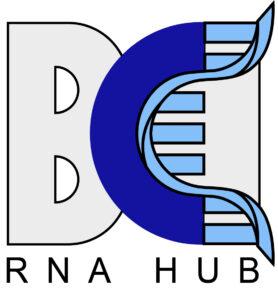RNA Biology
RNA is a central biomolecule of life, acting as a key mediator of gene expression by enabling the flow of genetic information from DNA to proteins. In addition, RNA plays a key role in many fundamental cellular processes such as protein synthesis, DNA replication and genome maintenance. Crucially, alterations in the life-cycle of various types of RNA are commonplace in cancer, and play an important role in the disease aetiology. These include alterations in the processing, modification, translation, and turnover of many different classes of RNAs.
At Barts RNA Cancer Hub, several research groups are trying to understand fundamental mechanisms by which changes in different aspects of RNA biology contribute to cancer initiation and progression. With the rise of RNA therapeutics, we believe such understanding will lead to the development of novel RNA-based diagnostic and therapeutic approaches in cancer treatment.
RNA UK 2024
The RNA UK 2024 meeting took place on 25th – 28th January in Windermere, UK, and was organised by Dr Lovorka Stojic, Dr Faraz Mardakheh and Prof. Kamil Kranc.
The organisers would like to thank the sponsors, the Genetics Society and the RNA society, as well as industry partners Novogene, Eclipse Bio and Cambridge Bioscience, for enabling us to have this meeting.
We look forward to the next RNA UK meeting, which will take place back in Windermere, in January 2026.
Barts RNA Cancer Symposium
The RNA Cancer Hub hosted its inaugural conference: the Barts RNA Cancer symposium on 15th June 2023. This one-day symposium provided a venue for world-renowned scientists, PhD students, postdocs and researchers in the field to exchange the latest findings in the field of RNA and cancer biology.
Thank you to all of our attendees who joined us at Charterhouse Square. Here are some photos from the day.
Meet the RNA Cancer Hub members
Kamil R Kranc
Many cancers with poor prognosis, including acute myeloid leukaemia (AML), are driven by treatment-resistant cancer stem cells, which are not fully eradicated using currently available chemotherapies, thus fueling severe relapses with devastating consequences to the patients. Professor Kamil Kranc’s Group has recently discovered that targeting YTHDF2, a reader of the m6A RNA modification, the most common internal modification of mRNA, selectively compromises cancer stem cells in AML while enhancing normal tissue functions. This research not only revealed YTHDF2 as a therapeutic target in AML, but also established that targeting readers of RNA modifications may be a promising therapeutic strategy to eliminate cancer stem cells in blood malignancies. This research is funded by a Cancer Research UK Programme Grant, and funding from Blood Cancer UK and Barts Charity.
Faraz Mardakheh
It is now clear that a significant degree of gene expression dysregulation in cancer occurs post-transcriptionally i.e. after synthesis of RNA from DNA. RNA Binding Proteins (RBPs) are the main post-transcriptional regulators of gene expression, controlling all aspects of the RNA life cycle such as processing, modification, transport, translation, and decay. However, it is still largely unclear how different RBPs are dysregulated during the course of cancer progression, in order to promote different aspects of malignancy. In Dr Faraz Mardakheh's lab, they use various omics technologies to study the role of RBPs in cancer. In particular, they are experts in Mass Spectrometry (MS) based proteomics, using various MS techniques to quantitatively study processes such as protein translation and RNA-Protein interactions, as well as combining proteomics data with RNA-sequencing to reveal the intricacies of post-transcriptional regulation by RBPs.
Crucially, recent advances in RNA therapeutics mean that a more mechanistic understanding of RBPs contribution towards malignancy can potentially be used to develop novel therapies for tackling different cancers.
Diu Nguyen
Gene expression defines the fate and function of each cell. Our recent work and others have demonstrated that post-transcriptional regulation of gene expression by RNA-binding proteins (RBPs) plays a critical role in cancer including leukaemia (Vu,…, Nguyen et al. 2017; Nguyen et al. Nat. Comms 2020; Cheng,…, Nguyen et al. Cancer Cells 2021; Prieto and Nguyen et al. Nat Cancer 2021). Importantly, the identification of dysregulated RBPs in leukaemia has led to the rapid development of therapeutic strategies to specifically target several RBPs. Despite their importance and therapeutic potential, only a small fraction of RNA regulators (>1,700 known RBPs) has been investigated in leukaemia.
My research aims to expand understanding of how dysregulated post-transcriptional processes contribute to the initiation and progression of various types of leukaemia, with a particular focus on acute myeloid leukaemia (AML). To achieve this aim, we will:
- Determine the role of a subset of aberrantly expressed RBPs in leukaemic stem cell survival and whether they contribute to leukaemia pathogenesis
- Investigate how these RBPs control normal haematopoietic stem cell behaviours
- Elucidate the molecular basis for RBP functions in blood cancer
Prabhakar Rajan
Dr Prabhakar Rajan's lab (UroSplice Group) are studying how alternative splicing and RNA-binding proteins impact on prostate cancer phenotypes, and identifying new prostate cancer RNA biomarkers of disease progression. The group's main interests lie in the transcriptional and post-transcriptional regulation of alternative splicing, and the impact thereof on cancer-related splicing events underlying key biology. They are exploring novel links between splicing regulation and the tumour microenvironment following key genomic changes in prostate cancer.
Kevin Rouault-Pierre
Increased genomic and transcriptomic sequencing have revealed that, through various means, mRNA splicing is altered in cancer. Mutations or changes in expression levels of splicing factors (SF) and RNA binding proteins (RBPs) can lead to dysfunctional gene splicing and activation of oncogenic pathways. Mutations in splicing factors are frequent across cancers, with the SF3B1 gene being the most commonly altered. Altogether alteration in SFs and RBPs promote a general acceptance that aberrant splicing is a pan-cancer hallmark that drives disease progression.
Splicing factors are mutated in >50% of patients with myelodysplastic syndromes (MDS); Dr Kevin Rouault-Pierre's lab previously demonstrated that SF3B1 mutations originate from the most immature haematopoietic compartment in MDS and published in-vivo and in-vitro models to study clonal architecture and dynamic at different stages of the disease, from pre-malignant to acute myeloid leukemia (AML) transformation. MDS cells often present differentiation blockage and we know that splicing events will depend on variants’ expression which will be, to some extent, different between stem and progenitor cells. Therefore, Dr Rouault-Pierre's lab investigate the impact of SF3B1 mutations in cells undergoing differentiation in MDS models that will allow us to study pre/malignant stages and overt cancer upon progression of MDS towards AML.
Tyson V Sharp
Professor Tyson Sharp’s group is interested in the microRNA (miRNA) pathway, which is a post-transcriptional gene silencing mechanism in cells. The miRNA-silencing regulatory pathway impinges on aspects of cell biology and organism physiology. The importance of this pathway in cancer biology is reflected by the fact that in the last 5 years alone, over 35,000 articles have been published on miRNAs in cancer according to PubMed.
Professor Sharp’s group's interest in RNA biology is primarily investigating how:
- The LIMD1 family of scaffold proteins (LIMD1, Ajuba and WTIP (LAW)) co-ordinates and regulates the microRNA-induced silencing complex – miRISC for short. This complex is the key effector of microRNA function in the cell, although the functional diversity of miRISC species is currently unclear. The role of LAW proteins in the assembly of different species of miRISC is therefore an active area of research in the lab.
- How the loss of LAW proteins in cancer affect miRISC function, gene expression and, in turn, how this ultimately impacts on carcinogenesis.
Lovorka Stojic
Mistakes during cell division can lead to genome instability, which underlies many human diseases including cancer. To avoid these errors, cell division is controlled at multiple levels by “guardian” proteins. However, only 2% of the human genome codes for proteins, with the majority of the human genome being transcribed into noncoding RNAs (ncRNAs) that have important cellular functions without requiring translation into proteins.
The Stojic laboratory is interested in one group of these ncRNAs, namely long noncoding RNAs (lncRNAs), and their role in control of cell division and maintenance of genome stability. Since lncRNAs are also deregulated in different types of cancer, there is an unmet need to understand how these RNA molecules contribute to known hallmarks of cancer.
In order to understand how lncRNA-mediated regulatory networks control cell division and determine their functional relevance in cancer, the Stojic lab aim to:
- Functionally dissect how lncRNA genes involved in the control of cell division maintain genome stability
- Identify the mechanisms whereby lncRNAs safeguard genome integrity
- Determine the impact of lncRNA dysregulation on genome instability in cancer
Jun Wang
The rich resources of publicly available data, such as those generated by the Cancer Genome Atlas and International Cancer Genome Consortium, have provided great opportunities to systematically study the functionality and clinical relevance of many novel genes, including long non-coding RNAs (lncRNAs). Their roles in cancer development and progression remain unexplored in many cancers. Dr Jun Wang's lab is interested in applying bioinformatics and computational approaches to analyse large-scale cancer datasets to uncover novel diagnostic and prognostic RNA features.
Dr Wang's lab is focusing on two areas:
- Characterising known and novel lncRNAs associated with disease progression and tumour microenvironment. Currently, they are using high-grade serous ovarian cancer as a study model.
- Identifying functional non-coding mutations that contribute to the dysregulated RNA genes, including lncRNAs. Currently, they are integrating ChIP-seq, RNA-seq, WGS and STARR-seq to explore non-coding driver events in pancreatic cancer.
Key Publications from the Barts RNA Cancer Hub
- A prometastatic splicing program regulated by SNRPA1 interactions with structured RNA elements. Science (2021) 372(6543): eabc7531. PMID: 33986153
- mRNA m6A reader YTHDF2 supresses pro-inflammatory pathways to protect haematopoietic stem cells from exhaustion. J Exp Med (2020)
- A high-content RNAi screen reveals multiple roles for long noncoding RNAs in cell division. Nature Communications (2020) 11(1):1851. PMID: 32296040
- Subcellular mRNA localization regulates ribosome biogenesis in migrating cells. Developmental Cell (2020) 55(3):298-313.e10. PMID: 33171110
- RBMS1 suppresses colon cancer metastasis through targeted stabilization of its mRNA regulon. Cancer Discovery (2020) 10(9):1410-1423. PMID: 32513775
- Targeting the RNA m6A reader YTHDF2 selectively compromises cancer stem cells in acute myeloid leukemia. Cell Stem Cell (2019) 25(1): 127-148. PMID: 31031138
- Androgen Receptor Burden and Poor Response to Abiraterone or Enzalutamide in TP53 Wild-Type Metastatic Castration-Resistant Prostate Cancer. JAMA Oncol (2019) 5(7):1060-1062. PMID: 31046065
Major Funders
- Cancer Research UK
- Blood Cancer UK
- Barts Charity
- Medical Research Council
- Royal College of Surgeons of England
- The Urology Foundation
- John Black Charitable Foundation
- CRUK Barts Centre
- Orchid Charity
- Kay Kendall Leukaemia Fund
- BBSRC
- British Lung Foundation
- Academy of Medical Sciences
- The Italian Association for Cancer Research (AIRC)
RNA Hub logo designed by Marzia Munafo









